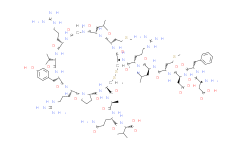| Cas No.: | 359784-84-2 |
| Chemical Name: | [ala17]-mch |
| Synonyms: | [ala17]-mch;BU 239 hydrochloride; |
| SMILES: | CSCC[C@@H]1NC(=O)[C@@H](NC([C@@H](NC([C@@H](NC([C@@H](NC([C@@H](NC([C@@H](NC([C@H](CC(=O)O)N)=O)CC2C=CC=CC=2)=O)CC(=O)O)=O)CCSC)=O)CC(C)C)=O)CCCNC(=N)N)=O)CSSC[C@@H](C(N[C@H](C(N[C@H](C(N[C@H](C(=O)O)C(C)C)=O)CCC(=O)N)=O)C)=O)NC(=O)[C@@H]2CCCN2C(=O)[C@H](CCCNC(=N)N)NC(=O)[C@H](CC2C=CC(O)=CC=2)NC(=O)[C@H](C(C)C)NC(=O)[C@H](CCCNC(=N)N)NC(=O)CNC(=O)[C@H](CC(C)C)NC1=O |
| Formula: | C97H155N29O26S4 |
| M.Wt: | 2271.7073 |
| Purity: | >98% |
| Sotrage: | Please store the product under the recommended conditions in the Certificate of Analysis. |

 DC Chemicals' products qualify for U.S. tariff exemptions. We guarantee no price increases due to customs duties and maintain stable supply, continuing to deliver reliable research solutions to our American clients.
DC Chemicals' products qualify for U.S. tariff exemptions. We guarantee no price increases due to customs duties and maintain stable supply, continuing to deliver reliable research solutions to our American clients.





















